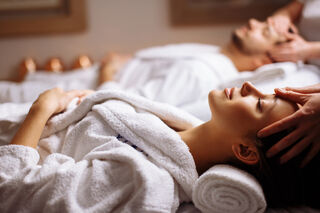Sex
Do Good-Looking People Really Have Easier Lives Than Everyone Else?
In defense of being beautiful.
Posted September 3, 2021 Reviewed by Tyler Woods
Key points
- Research suggests that good looking people enjoy a range of preferential treatments in life.
- However, research also reveals some downsides to being good looking.

It has been well-documented that people who are physically attractive, both men and women, enjoy a plethora of benefits and privileges in life (Dion et al., 1972). From getting higher marks in school for handing in the same quality work to receiving more help when needed, from having an easier time job hunting, to getting higher salaries, they have an advantage. Good-looking people are also less likely to be judged as guilty in legal and courtroom settings, not to mention the obvious advantages they possess in the relationship and dating departments. Even in childhood, kids who are cuter are often treated more favorably. Numerous research studies, articles, and anecdotal pieces of evidence are available that give a very comprehensive coverage of this “beauty premium” phenomenon (e.g., Dossinger et al., 2019; Greitemeyer, 2020), and its underlying mechanisms. These are therefore not the focus of the present short article. Here, we look specifically at the other side of the coin, which is often neglected—are there aspects in life wherein physically attractive people struggle with more?
Envy-Related Hostility
While it is true that better-looking people are often more liked by the opposite sex, the reverse is also true for others of the same sex (Agthe et al., 2010). For instance, good-looking students are more likely to be socially excluded or bullied by those of the same sex than their less attractive counterparts, presumably as a result of envy. A similar dynamic can be observed in workplace settings where good-looking employees face a greater level of hostility from colleagues and superiors of the same sex. Furthermore, physically attractive candidates are typically less successful in job interviews with interviewers of the same sex, and this is believed to be because they are seen as a threat.
Negative First Impressions
People often make positive trait inferences upon initial encounters with good-looking people, such as assuming good-looking people to be more intelligent, healthy, and kind. However, there are also many undesirable traits that are automatically assumed to accompany physical attractiveness (Gallucci & Meyer, 1984), and needless to say, these negative impressions could then detrimentally affect interpersonal relationship development and progression. For example, good-looking people often give off the initial impression of being self-centered, entitled, incompetent, and promiscuous. Being too attractive can also make people seem unapproachable and intimidating. Interestingly, even positive trait assumptions can have undesirable consequences, such as doctors not taking symptoms seriously due to assumptions of better health in the physically attractive.
So Do Attractive People Really Have It Easy In Life?
Although the research literature has largely identified and investigated the positives associated with being good-looking, and research on the dark side of being good-looking is admittedly scant in comparison, this does not mean that the struggles of the physically attractive are insignificant. For instance, of the various points outlined above, workplace disadvantages alone would have a profound effect on life. This is because approximately 50 percent of our co-workers in the average workplace are expected to be those of the same sex, for obvious reasons. Therefore, the advantage of being good-looking may be more or less offset by the accompanying disadvantages. This percentage is often much higher for certain groups of people such as nurses, construction workers, information technology workers, athletes, and flight attendants. It follows then that the beauty premium could really only be experienced in the workplace setting by the minority of people who are both good-looking and work in an environment dominated by co-workers of the opposite sex. Given that work is an enormous part of life, and that it is only one of the many domains covered above, it seems like the commonly held anecdote “good looking people have life on easy mode” may be a bit of an overstatement, and overgeneralization.
Facebook image: UfaBizPhoto/Shutterstock


